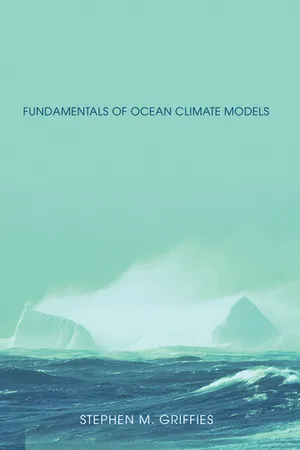
- English
- PDF
- Available on iOS & Android
Fundamentals of Ocean Climate Models
About this book
This book sets forth the physical, mathematical, and numerical foundations of computer models used to understand and predict the global ocean climate system. Aimed at students and researchers of ocean and climate science who seek to understand the physical content of ocean model equations and numerical methods for their solution, it is largely general in formulation and employs modern mathematical techniques. It also highlights certain areas of cutting-edge research.
Stephen Griffies presents material that spans a broad spectrum of issues critical for modern ocean climate models. Topics are organized into parts consisting of related chapters, with each part largely self-contained. Early chapters focus on the basic equations arising from classical mechanics and thermodynamics used to rationalize ocean fluid dynamics. These equations are then cast into a form appropriate for numerical models of finite grid resolution. Basic discretization methods are described for commonly used classes of ocean climate models. The book proceeds to focus on the parameterization of phenomena occurring at scales unresolved by the ocean model, which represents a large part of modern oceanographic research. The final part provides a tutorial on the tensor methods that are used throughout the book, in a general and elegant fashion, to formulate the equations.
Frequently asked questions
- Essential is ideal for learners and professionals who enjoy exploring a wide range of subjects. Access the Essential Library with 800,000+ trusted titles and best-sellers across business, personal growth, and the humanities. Includes unlimited reading time and Standard Read Aloud voice.
- Complete: Perfect for advanced learners and researchers needing full, unrestricted access. Unlock 1.4M+ books across hundreds of subjects, including academic and specialized titles. The Complete Plan also includes advanced features like Premium Read Aloud and Research Assistant.
Please note we cannot support devices running on iOS 13 and Android 7 or earlier. Learn more about using the app.
Information
Table of contents
- Cover
- Title Page
- Copyright Page
- Contents
- FOREWORD
- PREFACE
- ACKNOWLEDGMENTS
- ABOUT THE COVER
- LIST OF SYMBOLS
- Chapter 1. OCEAN CLIMATE MODELS
- PART 1. FUNDAMENTAL OCEAN EQUATIONS
- PART 2. AVERAGED DESCRIPTIONS
- PART 3. SEMI-DISCRETE EQUATIONS AND ALGORITHMS
- PART 4. NEUTRAL PHYSICS
- PART 5. HORIZONTAL FRICTION
- PART 6. TENSOR ANALYSIS
- PART 7. EPILOGUE
- BIBLIOGRAPHY
- Index